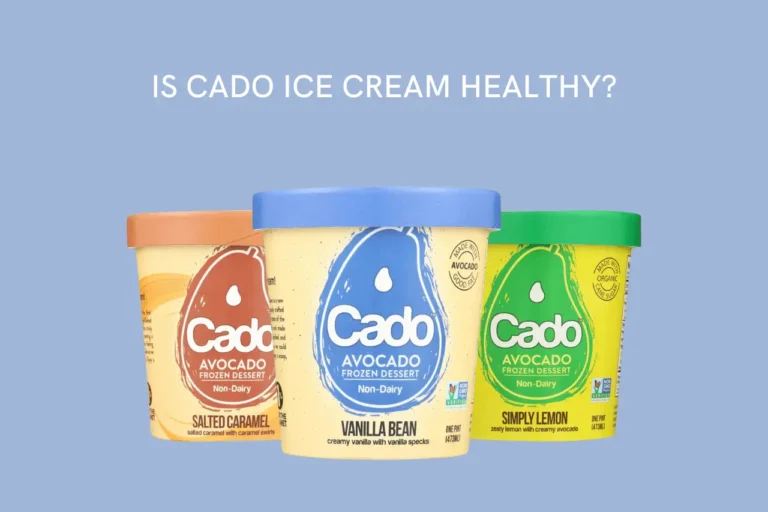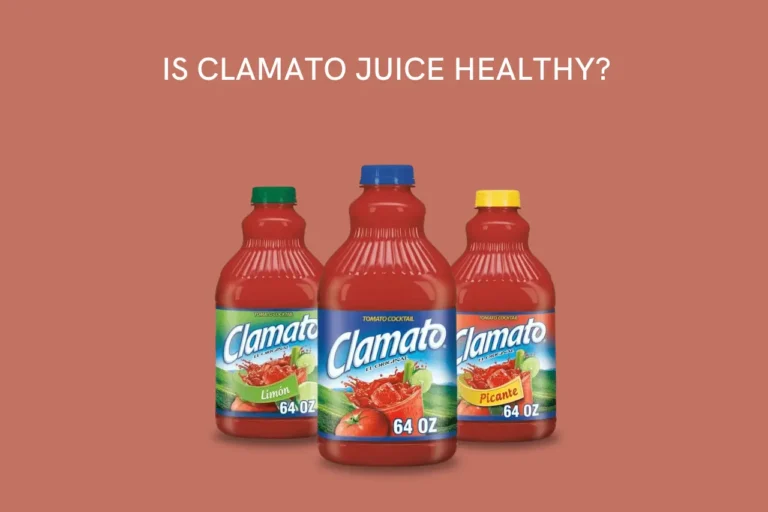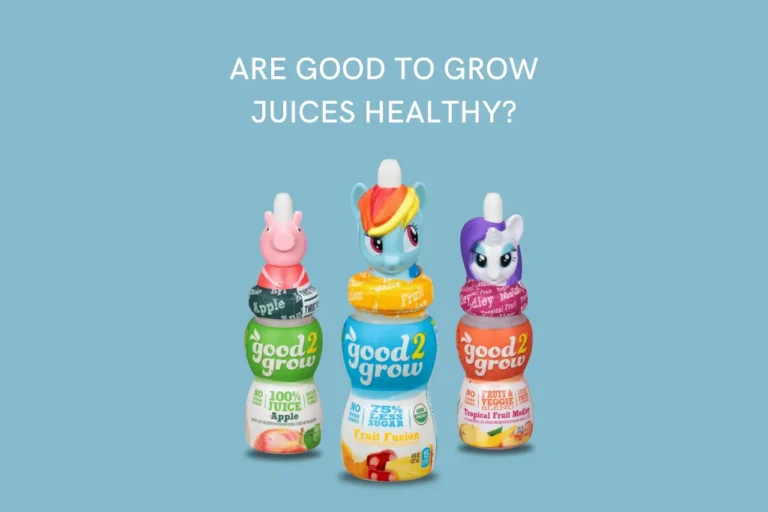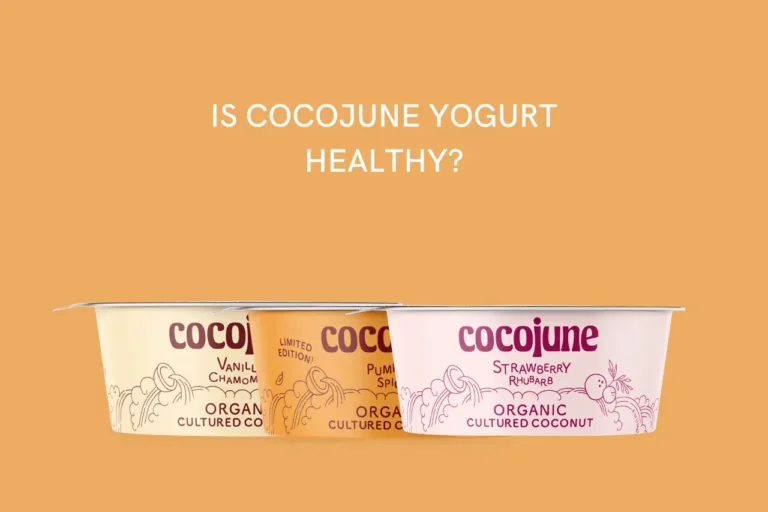Saffola Masala Oats is a popular breakfast option in India that is marketed as a healthy and nutritious choice. It is made with oats, a whole grain that is high in fiber and nutrients, and a blend of spices and vegetables.
However, in addition to oats, it contains a slew of other ingredients that raise concerns about its healthiness.
So, is saffola masala oats healthy? or it is just another unhealthy packaged breakfast option?
Short answer: Saffola masala oats is not a healthy option as it is extremely high in sodium and contain unhealthy ingredients such as maltodextrin and flavor enhancers. However, it can still be a part of your diet but in moderation and not regularly.
If you want a better overview of Saffola masala oats, keep reading till the end of this post.
Let’s begin.
Nutrition value of Saffola masala oats
Saffola Masala oats is high in protein, fiber, and carbs, which makes it a popular breakfast option. It is low in fat and has no cholesterol.
However, at the same time, it also has high levels of sodium.
Here are the nutrition facts for 100gm of Saffola Masala oats(Classic masala):
- Calories: 362
- Fat: 12gm
- Carbohydrates: 64gm
- Sugar: 4.7gm
- Cholesterol: 0mg
- Protein: 11.9gm
- Fiber: 12.7gm
- Sodium: 2126mg
Ingredients in Saffola masala oats
Saffola masala oats is made up of a blend of spices, dried vegetables, and oats. The exact ingredients used vary depending on the flavor, but some of the most common ingredients include:
- Rolled oats: These are a type of whole grain that are first steamed and then rolled into flakes. This process gives oats a chewy texture and nutty flavor. This type of oats takes less time to cook.
- Maltodextrin: It is a white powder that is derived from starch. It is commonly used as a food additive or thickener in food products.
- Iodised salt: It is a type of salt that has been treated with iodine and used in food to help ensure that people get enough of it in their diet.
- Dried vegetables: These are vegetables that have been dried to retain their nutrient content and prolong their shelf life. These are added to food products to make them nutritious.
- Edible vegetable oil (Refined rice bran oil): Refined rice bran oil is an edible oil extracted from the bran of rice. It is high in nutrients and antioxidants and has a neutral flavor, making it a popular choice for use in many different food products.
- Hydrolysed vegetable protein: It is a food additive used to add flavor or enhance food flavor. It is made from vegetables treated with heat and chemicals to break down the proteins into smaller units.
- Flavor enhancers: These additives are used to improve the flavor of food products. The two common flavor enhancers in Saffola masala oats are Disodium guanylate (INS 627) and Disodium 5′-inosinate (INS 631).
5 Reasons Saffola masala oats is not healthy
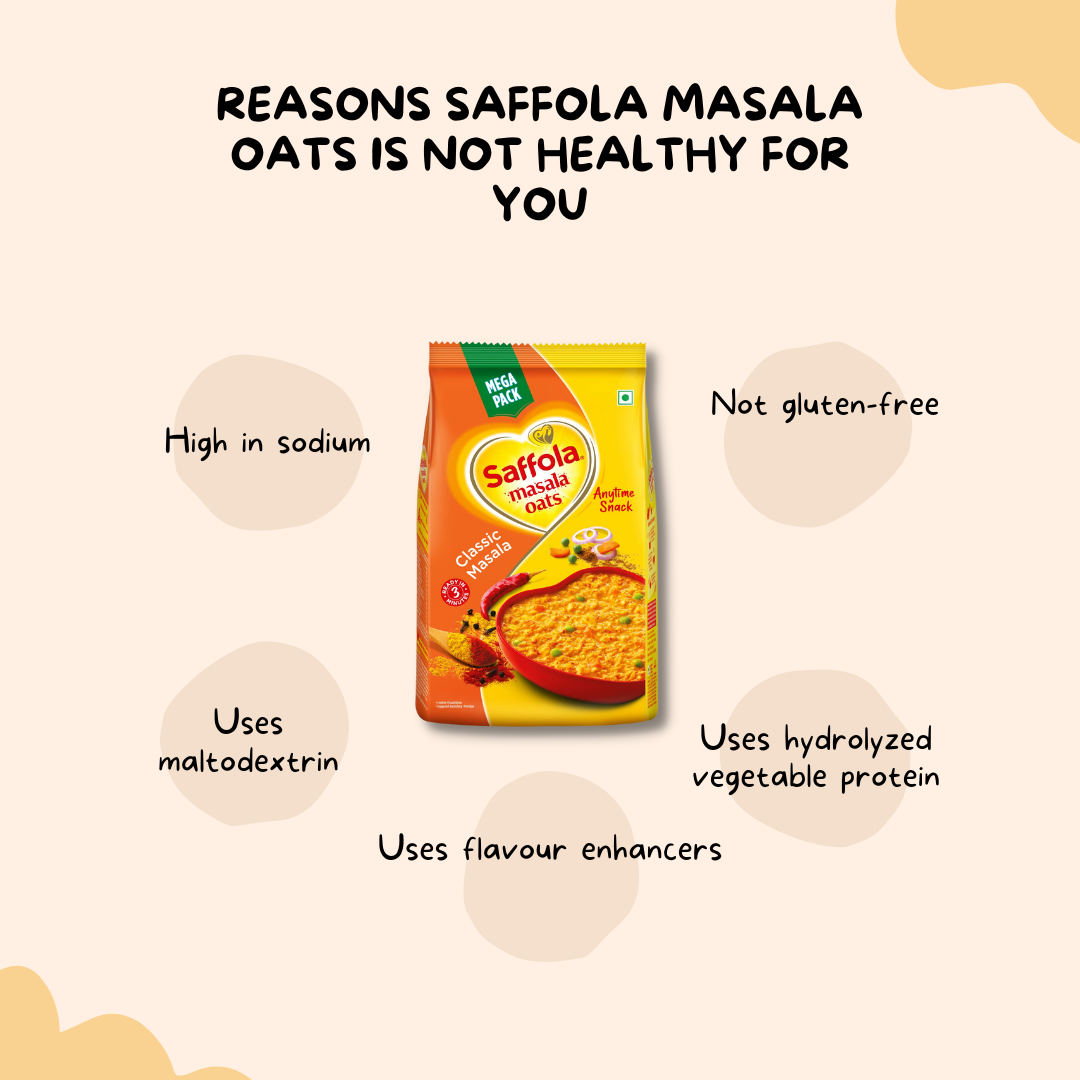
While oats are generally considered to be healthy food, Saffola masala oats are loaded with unhealthy ingredients like maltodextrin, flavors enhancer, and colors.
Use of maltodextrin
Oats with water or milk are all that are required to make a nutritious bowl of oatmeal. However, producers add extra ingredients that are highly processed and not very good for your health.
Saffola masala oats contain Maltodextrin, a highly processed food additive in the form of white powder that is often used as a thickening agent or to add texture to processed foods.
While maltodextrin is generally considered safe by U.S. Food and Drug Administration(FDA), there have been reports of potential downsides to its use in food products.
According to research, consumption of foods containing maltodextrin is linked to Inflammatory bowel diseases (IBD) such as ulcerative colitis and Crohn’s disease.
Additionally, Saffola masala oats is not good for people with diabetes, as the maltodextrin it contains has a high glycemic index (105-185). This may adversely affect blood sugar levels and worsen the condition.
Use of flavor enhancers
While flavor enhancers are deemed safe for human consumption, they have been found to have certain side effects in some people.
According to a source, flavor enhancer (INS 627), also known as Disodium guanylate, has been linked to the experience of dizziness, vomiting, headache, and nausea.
Also, it may cause certain allergic reactions, such as red rash, shortness of breath, watering eyes, and runny or blocked nose. Moreover, avoid it if you are a person with gout or a history of kidney stones.
Another flavor enhancer in Saffola masala oats includes (INS631) or Disodium 5′-inosinate. As per some sources, consumption of INS 631 may cause a lack of sensation or numbness in people. Moreover, if you are asthmatics, you should avoid it.
There is no need to consume oats that have flavor enhancers.
If you want flavor in your oats, you can do it yourself with nuts, seeds, raw honey, or berries. It will taste much better, and the most significant thing is it will be healthier for you.
High in sodium
Although it is desirable to have some amount of sodium in masala oats, Saffola masala oats have too much of it, which is not good for your health.
A 35g serving of Saffola masala oats contains 740mg of sodium, around 32% of the daily value. If you eat two servings of Saffola masala oats a day, you are consuming 60% of the daily sodium intake.
You may also be getting sodium from other sources, which could lead to consuming too much sodium overall.
Eating too much sodium can lead to many health problems such as:
- High blood pressure
- Dehydration
- Calcium loss
- Hypertension
- Heart disease
- Stroke
- Obesity
- Swelling
Use of hydrolyzed vegetable protein
While hydrolyzed vegetable protein (HVP) may be used as a flavor enhancer in saffola masala oats, it is important to note that it naturally contains MSG.
MSG, or monosodium glutamate, is the same flavor that made Maggi banned in 2015. It has been linked to many health conditions, such as headaches and allergic reactions.
According to research, HVP may naturally contain 10 to 30% MSG, but food companies are not required to label food products as containing MSG. This lack of transparency may be a problem for consumers, especially those sensitive to MSG.
As per a study, sources containing MSG can trigger headaches in people. So if you frequently suffer from headaches, it’s best to avoid consuming food containing hydrolyzed vegetable protein.
Also, people sensitive to MSG should avoid HVP-containing foods as they will have the same effect on you as MSG.
Not gluten-free
Although oats don’t naturally contain gluten, many of them do when they’re processed.
Saffola masala oats are not gluten-free, so, If you’re gluten-intolerant, choose oats that are labeled gluten-free.
Is saffola masala oats good for weight loss?
While oats are a healthy food item that can help you in your weight-loss journey, the processed ones that come with unnecessary food additives such as maltodextrin and flavor enhancers may do more harm than good. Also, high sodium consumption has been associated with weight gain.
So if you want to eat oats for weight loss, saffola masala oats might not be a good choice.
Instead, look for oats with only oats as the ingredients and no additional additives and sugar.
Final words
While oats are considered as the healthiest breakfast option to start your day, saffola masala oats are certainly not the healthy oats out there. This is because it is high in sodium and contains unnecessary additives just to make it more flavorful.
However, If you don’t have any other option, you can eat it occasionally, but it should not be a part of your daily diet.
Lastly, If you really want to get the benefits of eating oats, go for other additives and sugar-free oats brands.
Found this information helpful? Share it with the world.
Here are a few other posts that might be helpful for you.

